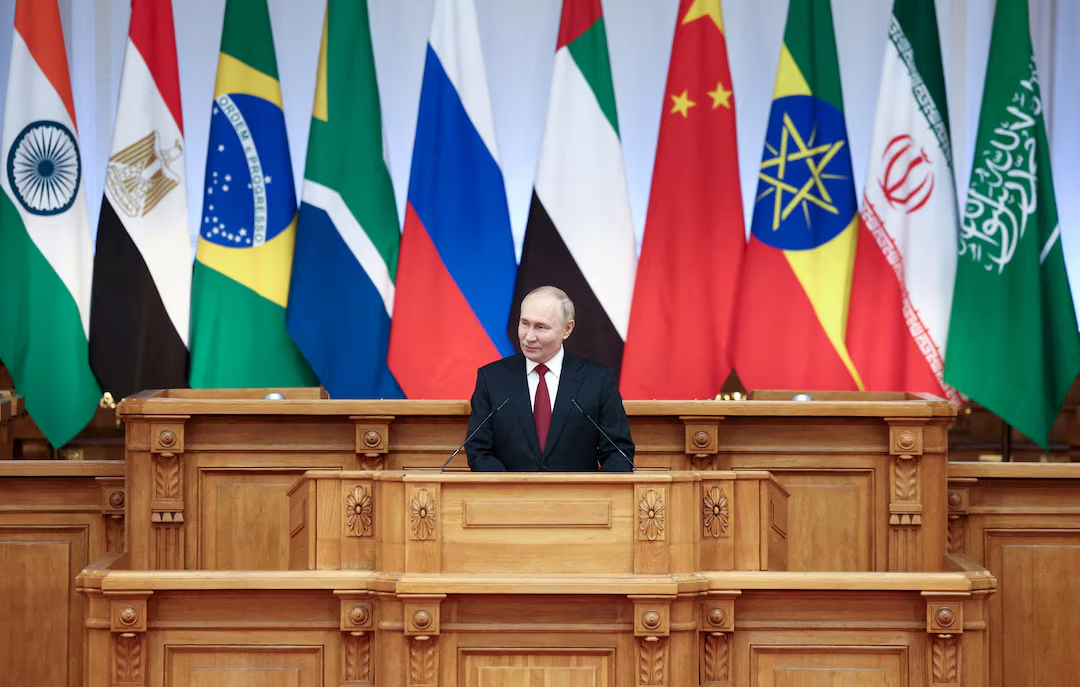MOSCOW, RUSSIA – Russian President Vladimir Putin summoned a BRICS summit Tuesday of high stakes, as leaders from Brazil, India, China, and South Africa came to Moscow. The meeting cast the shadow of a widely reviled and ongoing war in Ukraine, increasing the stakes and adding to geopolitical tensions surrounding whether the bloc still can effectively project its influence in this increasingly polarized world.
BRICS Seeks to Navigate Global Turbulence
The summit was focused on deepening economic cooperation and reformulating the role of global governance in a divided world where the West has become increasingly at odds with the Global South. It speaks to Putin’s wish to stay relevant in the international community even while under strict international isolation during his hosting of the summit.
The BRICS agenda this year has been replete with talk of expanded trade in local currencies, alternatives to the United States’ dollar, and strengthening multilateral relationships. Particular to the financial arm of the bloc, the New Development Bank, stole the headlines as it promised to up funding for member states and rising powers. Yet the headliner of sideline talks all year has been the Ukraine conflict and how difficult it has been to avoid its influence on the cohesion of this bloc and this bloc’s international image.
Balancing Geopolitics: Allies or Neutral Partners?
BRICS constitutes an unorthodox partnership of the divergent and diverse political interests. The historically devoted Beijing has diplomatically and economically been close to Moscow, and it has upheld, even more lately, its commitment to multilateralism; still, in the matter of war in Ukraine, the attitude of Beijing remains confusing. Chinese President Xi Jinping underscored the issue of “global stability” while hedging about the facilitation of these economic initiatives of the bloc.
Now, Indian Prime Minister Narendra Modi walked this fine line, promoting economic cooperation without seeming to join either side of the Ukrainian conflict. The non-aligned policy of India represents a desire of this state to pursue diplomatic flexibility in the context of sustained trade relationship with Russia as well as in its relationships with Western powers.
Brazil and South Africa, on their individual domestic issues, expressed that they are not interested in geopolitical competition. Meanwhile, Brazilian President Luiz Inácio Lula da Silva emphasized that BRICS should be a force for development, and it’s through diplomacy that the world conflicts should be resolved. South African President Cyril Ramaphosa corroborated such sentiments and said that such a block should focus on growth and pooled prosperity with no stance on the war.
Putin’s Diplomatic Show of Strength
The summit also provided an opportunity for Putin to showcase resilience in the face of growing international sanctions and diplomatic isolation. The ability to host the leaders of BRICS in Moscow allowed Putin to emphasize that Russia is not as isolated as U.S. and European powers like to paint it.
“BRICS is not just an economic alliance; it is a platform for forming a new global order,” Putin declared in opening remarks. He complained about NATO expansion and Western sanctions as attempts to strangle Russian sovereignty. Putin also expressed interest in deepening energy cooperation with China and India, which have upped oil and gas purchases from Russia following Europe’s embargoes.
According to observers, Putin’s appearance at the summit is a very bold diplomatic statement at a time when European countries are tightening sanctions against Russia and Ukrainian counteroffensives intensify. Nonetheless, experts say the war in Ukraine could complicate BRICS’ efforts to establish itself as a free, stabilizing entity in international politics.
A Divided Global Order
BRICS has been marred by this strategic contradiction at the Moscow summit, where the group is trying to present a united front. On the one hand, the bloc believes in a multipolar world order, and the war in Ukraine has thrown into relief differences in interest on the side of those entities that seem now even to approach getting closer to each other. India, Brazil, and South Africa appear careful not to get too close to one side of global conflict.
Political analysts believe that for the very credibility of BRICS, as an alternative to Western-led institutions, the bloc is likely to act cohesively over such geopolitical differences. Though the call for financial reforms and alternatives to U.S.-dominated trade systems resonates well with many developing nations, BRICS without this consensus on issues like the Ukraine conflict stands at the risk of appearing fragmented before the global community.
A Defining Moment for BRICS
A BRICS summit now in Moscow could be at a very critical juncture for Russia as well as the broader geopolitical landscape. With the war in Ukraine dragging into its second year, Russia’s medium-term strategy would hinge on whether it can establish political and economic symbiosis through platforms like BRICS or otherwise. The bloc must exert more strain on unity and diplomatic finesse to remain relevant as a counterweight to Western influence.
It finally reiterated BRICS’ potential for reshaping the present landscape of global governance and then reviewed how it faces the harder task of balancing different national interests. The drift of the world into an era of shifting alliances, the future outcome of this summit is likely to influence the future course of international relations-and the role that BRICS will play in it.
